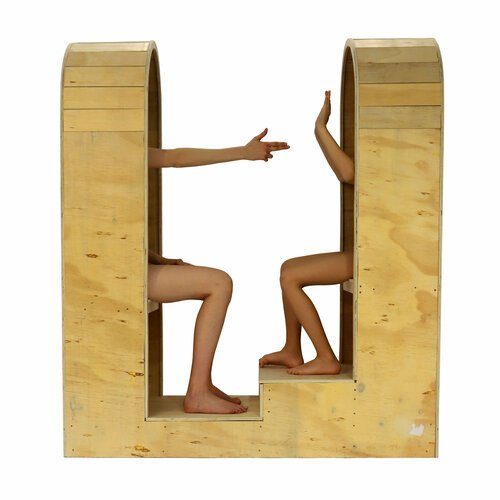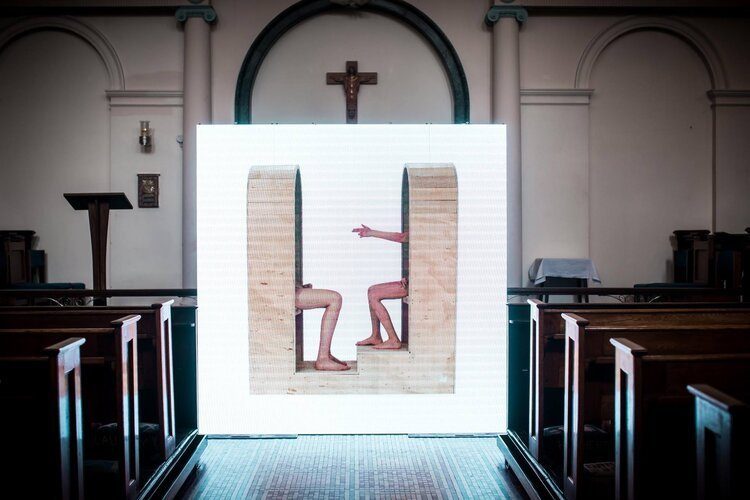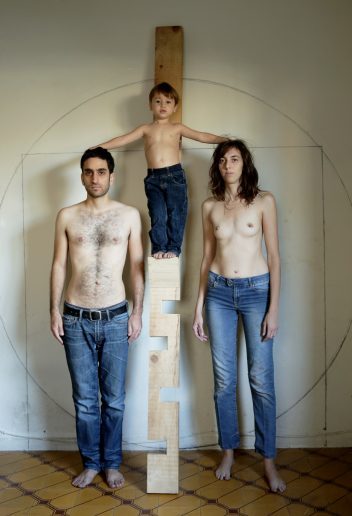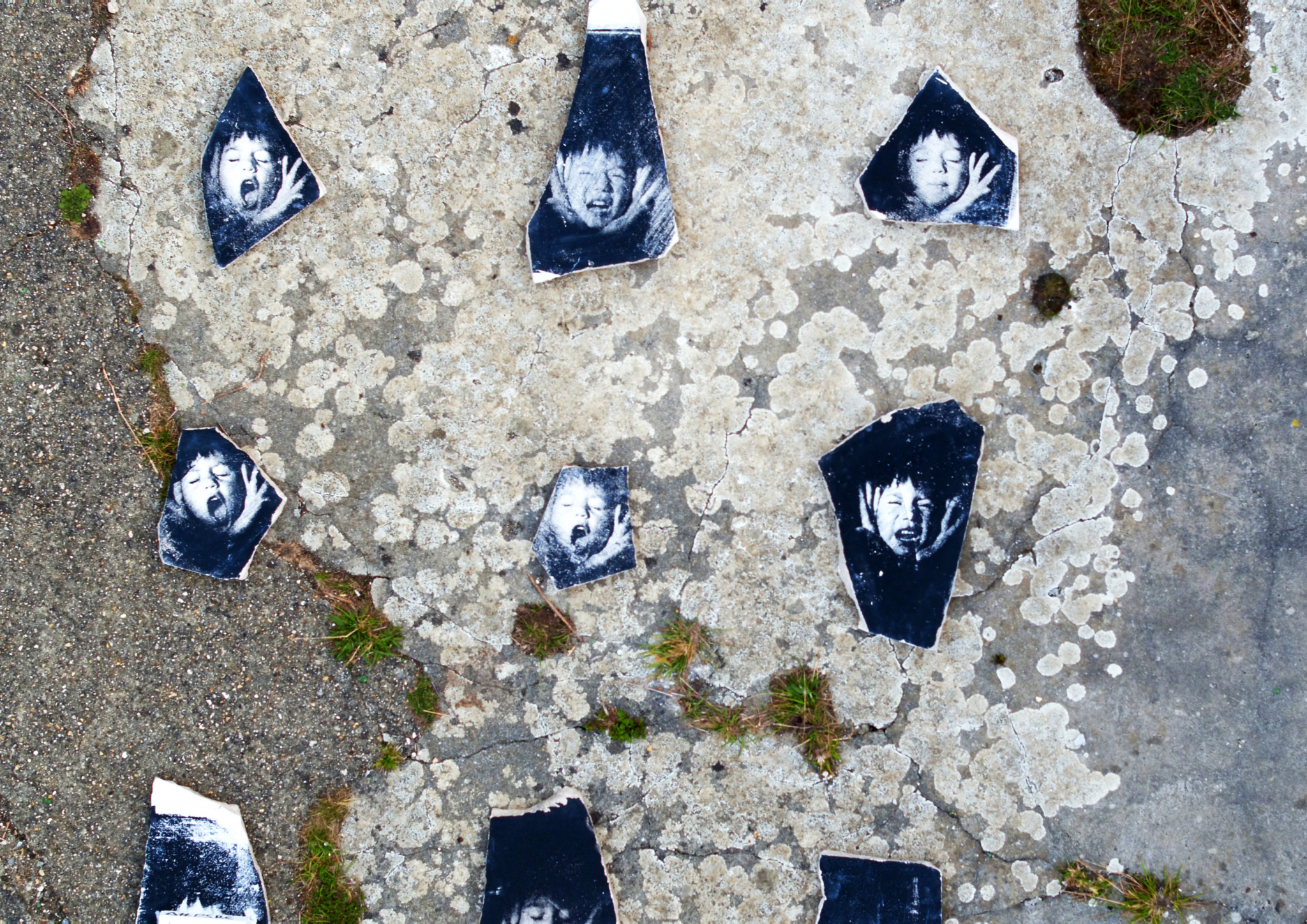Leni Dothan – Deconstructing the Virgin Mary and other preconceived ideas of motherhood
by Ana Sanfrutos
When I was invited from my friend and fellow curator, Ludovica Cadario (Madrid office director of MTArt Agency) to review one of the artists that form part of the MTArt Agency Corporate Collection, I was immediately drawn to the Jesus of the Jeans by Leni Dothan, which hangs in Marine Tanguy’s private home. Starting with this powerful and meaningful piece, I took a deep tour into the artist’s visual materials and statements. Getting to know Leni Dothan’s work has been a fascinating discovery. All of her pieces have captivated me in one form or another. Nevertheless, I would like to focus on a small selection from the three projects that draw my attention the most, and that, in my opinion, are key to understanding the artist’s practice, including, of course, the piece from Tanguy’s collection that started it all.
Leni Dothan’s work is profound and multifaceted. Her main interests revolve around deepening the conceptions of motherhood, showing a deconstructive process of Christian mythology, in particular the relationship between Mary and Jesus, and the idea of sacrifice and the suffering of the Pietà. She is particularly interested in the representations of these symbols during the Renaissance and the extended iconography of the religious art of this period.
The process of creation that leads to the realization of the work is an important part of the piece itself. She also creates artefacts,‘Objects of Research’, as she calls them, whose signification is to be activated by use.
Dothan works can be seen as performative installations. Media such as photography, video, transfer, or painting, is called upon, whatever is required to make the concept come to life. Her works are not only a physical object, they are an explorative performance that starts at the beginning of the creative process. The piece, Motherchild Machine (2019), especially interests me.
The artist creates one of her ‘Objects of Research’, that serves as a stage to explore the relationship between mother and child, and deepen the mixed emotions about motherhood. The wooden structure forms a face to face sitting arrangement but from the outside, only parts of the legs and a hand, two fingers extended in the form of a gun, can be seen

Mother-child relationships are often seen as very unidimensional and any deviation or struggle in this unchangeable structure is taboo or an instant declaration of bad motherhood. Though not speaking from experience, I can imagine that the relationship between mother and child is far more complicated and multifaceted. Dothan’s structure reminds me of two confessional booths facing each other. What happens inside is secret, private, and it creates repentance as sin does. Or maybe it shouldn’t?
The piece was created for the second edition of the Oxytocin Symposium that took place inKing’s College Guy’s Campus in London. Dothan chose the chapel, a correct location for the placing of a video piece based on the object. This environment strengthens the symbology of the piece as a confessional and makes connections with the Christian iconography of motherhood and sacrifice while deconstructing the Mary and Jesus mythology.

Jesus of the Jeans (2012) is another work that revolves around another of these ‘Objects of research’, and is also based in Christian mythology. Dothan found a piece of wood on the street and carried it home, performing its own version of the Stations of the Cross. Once in the house, she built a platform for her son and posed with her family, the ultimate sacrifice ‘not for God but for the State’ wearing just jeans. The artists exhibited the sculptured piece in a gallery, where she invited the families from the public to be photographed in the sculpture, with the intention of raising questions about bodies, social norms, and political structures

Portland Stone Rehabilitation Centre (2018) is an experimental project that includes a large-scale installation formed by 200 stones painted with a special process that uses London’s airpollution as paint. The stones, taken from the Portland quarry, are brought to London to beexposed to the pollution and then returned to Portland to heal. The process of healing couldbe observed by the public during the Multimedia Art Festival of Portland

Dothan herself mentions that these eco-political works are another side of her ongoing practice implying a strong difference with her research of representations of women and mothers throughout history. I see, though, a deep connection between these two facets of her output, and not only basing this on the choice to represent mother and child as the motive of the stone’s paintings. Nevertheless, the following statements are just my particular interpretation of the piece, probably influenced by my own practice and interest as a curator. With her research and collaborative production, Dothan is demanding a more feminine outreach towards environmental policies: let’s take a more ecofeminist attitude towards our environment, let’s lead a responsible life, let’s start an equal relationship with Nature where caring replaces subjugation.

by Ana Sanfrutos

Ana Sanfrutos has been curating and managing contemporary art projects since 2007. First in Berlin, where she developed her early career, and since 2015 in Madrid. Ana is the co-founder and co-director of Hybrid Art Fair and Hybrid Festival, yearly international projects that focus their attention on Independent Art Spaces and emerging Artists. Since their beginning, both Fair and Festival have achieved great success, attracting over 200 artists and 5000 attendees in each edition. The projects have received funding from the Spanish Government and support from institutions like the Goethe Institut, The British Art Council as well as several private brands and foundations. Ana has also co-curated and co-organized, together with the collective Boreal Projects, the Impulsarte Young Artists Award and several collaborations with galleries and Art Festivals across Spain.